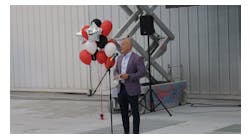Lufthansa Group Achieves Record Result in Second Quarter and Specifies Outlook
"Thanks to the great efforts of our employees, we were able to avoid a situation like last summer and once again offer our customers a more stable operation," said Carsten Spohr, CEO Lufthansa Group. "Whether on the ground, in the cockpit, in the cabin or in our maintenance hangars, it was our employees worldwide who made reliable flight operations and the financially best second quarter in our history possible. Thus, our clear focus on stability has proven to be the right choice for our customers, our employees and our shareholders. Besides that, we have sharpened our strategic focus with agreements on the sale of LSG Group and AirPlus as well as the agreement to acquire ITA.
"Our outlook indicates a continued positive development for customers, employees and shareholders: The specified profit forecast clearly shows that we are well on track to achieve the capital market targets we have set ourselves for the medium term. This enables us to make the planned investments in premium quality for our customers. The simultaneous continuation of our recruitment campaign with more than 1,000 new hires per month also creates new prospects for our employees. And last but not least, there is a special outlook for our Lufthansa long-haul fleet. Two more A380s will return to scheduled service this year, with more to follow along with new Boeing 787s and Airbus A350s in the coming year, into which we look with great optimism.”
Significant Improvement
At 9.4 billion euros, group revenues in the second quarter exceeded the previous year's value by about 17 percent (previous year: 8.0 billion euros). The operating result (adjusted EBIT) increased to 1.1 billion euros and thus almost tripled (previous year: 392 million euros). This corresponds to an operating margin of 11.6 percent and is a new record for a second quarter result at the Lufthansa Group. Net income also marked a new high of 881 million euros (previous year: 259 million euros).
For the first half of 2023, the group posted an adjusted EBIT of 812 million euros (previous year: -185 million euros) - an improvement of almost 1 billion euros. The adjusted EBIT margin rose to 4.9 percent in the first half-year (previous year: -1.4 percent). Revenues in the first half of 2023 were 16.4 billion euros (previous year: 13.0 billion euros).
Passenger Airlines Achieve Positive Result
The high global demand for air travel has led to a significant increase in passenger numbers at the group’s passenger airlines. Between January and June, the airlines welcomed more than 55 million travelers on board, an increase of 30 percent compared with the same period in 2022 (previous year: 42.4 million). In the second quarter alone, 33.3 million passengers flew with the group's airlines (previous year: 29.2 million). This corresponds to 84 percent of the 2019 level.
The passenger airlines in the Lufthansa Group steadily expanded the capacity on offer in the course of the first half-year. For the first six months it was 19 percent above the same period last year, but still 21 percent below pre-crisis levels. For the second quarter alone capacity on offer was at 83 percent of the pre-crisis year 2019. Capacity was also planned conservatively due to bottlenecks, particularly with handling service providers and air traffic control.
In the second quarter, the clear focus was again on ensuring stable flight operations. This strategy was successful. Punctuality improved to 70 percent in the first six months.
The persistently high demand, especially in the premium classes, coupled with restricted capacity led to a 13 percent increase in yields for the passenger airlines compared with the previous year. At a seat load factor of 83 percent, the Lufthansa Group's flights were as busy in the second quarter as they were before the coronavirus pandemic (2019: 83 percent).
Group airline expenses increased due to the high level of cost inflation across the industry, particularly for air traffic control and airport charges and the cost for maintenance and spare parts. In addition, one-time cost associated with the strong expansion of flight operations and extensive measures to support operational stability had a negative impact on passenger airline costs. Compared with the previous year, unit costs consequently increased by 7 percent.
Overall, the adjusted EBIT of the passenger airlines improved by around 1 billion euros to 965 million euros in the second quarter of this year (previous year: -86 million euros). All airlines in the segment achieved a positive result. Looking at the first six months, adjusted EBIT even rose by almost 1.7 billion euros to 453 million euros (previous year: -1.2 billion euros).
Lufthansa Cargo and Lufthansa Technik See Positive Result
The normalization of rates in the global airfreight market continued as expected in the second quarter of the year. Despite lower demand, however, Lufthansa Cargo's average yields remained a good 40 percent above the pre-crisis level of 2019, meaning that Lufthansa Cargo again outperformed the market as a whole in the second quarter. Freight capacity in the second quarter was six percent up on the previous year, mainly due to the recovery in passenger flight operations and the associated expansion of belly capacities.
Lufthansa Cargo thus gained market share in the second quarter. As a result of the market-wide developments, Lufthansa Cargo's adjusted EBIT decreased to 37 million euros (previous year: 482 million euros) but still remained significantly above the result achieved in 2019. In the first half-year, adjusted EBIT came to 188 million euros (previous year: 977 million euros).
Lufthansa Technik continued to report a very positive business performance in the second quarter of 2023. The MRO segment benefited from the persistently high demand for air travel across the market, which was accompanied by a further increase in demand from airline customers for maintenance and repair services.
Lufthansa Technik generated an adjusted EBIT of 156 million euros in the second quarter, an increase of 39 percent on 2022 and also a record for a second quarter (previous year: 112 million euros). For the first half-year, the company generated adjusted EBIT of 291 million euros, 21 percent more than last year (previous year: 241 million euros).
Balance Sheet Further Strengthened
Due to the strong operating result and high bookings, the Lufthansa Group generated an operating cash flow of 3.1 billion euros in the first half-year. After deducting net capital expenditure, which mainly related to the group’s investments in its future fleet of new-generation aircraft, an adjusted free cash flow of 1.1 billion euros was generated.
Net debt decreased to 5.9 billion euros as of 30 June 2023 (Dec. 31 2022: 6.9 billion euros) and was thus below the pre-crisis level from 2019. The group's net pension liabilities increased to 2.3 billion euros (Dec. 31, 2022: 2.0 billion euros) due to a slight decrease in long-term interest rates. Equity was 8.1 billion euros (Dec. 31, 2022: 8.5 billion euros).
At the end of June 2023, the company had access liquidity totaling 10.8 billion euros at its disposal (Dec. 31, 2022: 10.4 billion euros). This puts liquidity further above the target corridor of 8 to 10 billion euros.
A Milestone in the Transformation into an Airline Group
In the second quarter of the financial year 2023, the Lufthansa Group continued its transformation into an airline group. Three significant transactions were carried out within just three months between April and June.
In April the sale of the LSG group's remaining international catering business to the private equity company AURELIUS was announced. The sale of the payment services provider AirPlus to SEB Kort, which was announced in June, also marks an important step in the Lufthansa Group's focus on its core business.
In addition to the sales of the two aforementioned parts of the company, the acquisition of a minority share of 41 percent in the Italian airline ITA Airways was agreed in May. The contract stipulates that Lufthansa can also take over the remaining shares in ITA at a later date.
The acquisition of the minority stake in ITA Airways is subject to approval by the relevant authorities, which is expected by the end of the year.
Remco Steenbergen, chief financial officer of Deutsche Lufthansa AG, said: "I am proud that all passenger airlines were able to generate a strong operating result and that we achieved a record result in the second quarter. Lufthansa Group has shown over the past few years that it delivers on its promises. This also applies to the development of our portfolio, where we have made significant progress in our transformation into an airline group. In the coming months we will continue to work on getting as close as possible to our 2024 targets already in the current year."
Operational Stability and Capacity
In the first half of 2023, the Lufthansa Group continued to focus on ensuring a stable flight schedule. In order to create the necessary capacities, around 9,000 new employees were hired year-to-date - more than 1,000 per month. The new hires mainly relate to the Group's operating units.
New Aircraft, SAF, Green Fares
The Lufthansa Group takes its responsibility for effective climate protection seriously and has set itself ambitious goals. The company aims to become carbon neutral (“net zero carbon emissions”) by 2050. Already by 2030, the Lufthansa Group aims to halve its net CO₂ emissions compared to 2019 by means of reduction and compensation measures.
Modern, fuel-efficient, and lower-emission aircraft are the greatest lever for more sustainability. That is why the group invests more than 2 billion euros every year in around 200 new generation aircraft such as the Airbus A350, the Boeing 787, the Boeing 777-9 or aircraft from the Airbus A320neo family, which are to be delivered by 2030.
Sustainable aviation fuels (SAF) are a key technological innovation for more sustainable flying. The Lufthansa Group is already one of the world's five largest SAF customers. Based on existing agreements with various manufacturers and depending on customer demand, the Lufthansa Group could use up to one million tons of SAFs in 2030.
Since February, the Lufthansa Group has been the world's first airline group to offer its customers a separate flight tariff that already includes compensation for flight-related CO₂ emissions, the so-called Green Fares. SAF offsets 20 percent of emissions, while 80 percent are compensated through high-quality, long-term climate protection projects. Up until now, more than 265,000 customers have booked Green Fares.
Outlook
The Lufthansa Group expects demand for flight tickets to remain high for the rest of the year - people's desire to travel continues unabated. Currently, bookings for the months August to December 2023 are on average more than 90 percent of the booking volume of the pre-crisis level.
The company is therefore continuing its capacity expansion and plans to offer around 88 percent of pre-crisis capacity in the third quarter of the year. Due to the continued high demand for air travel and supported by industry-wide supply constraints, the company expects a further slight increase in yields compared to the record level of the previous year. Adjusted EBIT in the third quarter is thus expected to exceed the pre-crisis level of 1.3 billion euros in 2019.
The Lufthansa Group expects demand to remain high for the rest of the year especially in the premium classes, mainly driven by private travelers. Demand for business travel is also increasing and the Lufthansa Group expects it to recover to up to 70 percent of pre-crisis levels by the end of the year. Due to the persisting bottlenecks in the European air traffic system, however, the capacity offered by Lufthansa Group airlines will be at the lower end of the previous expectation range, that is around 85 percent.
Due to the strong outlook for the second half of the year, the group has specified its outlook for the full year 2023 and now expects to achieve an adjusted EBIT of more than 2.6 billion euros (previously: significant increase compared to the previous year's value of 1.5 billion euros). The result is thus expected to be one of the three best in the history of the Lufthansa Group. According to the company’s assessment, this specified forecast is in line with current market expectations.
Accordingly, 2023 is expected to form an important step towards achieving the financial targets the company has set itself for 2024. According to these targets, the Lufthansa Group expects to achieve an adjusted EBIT margin of at least 8 percent and an adjusted Return on capital employed (adjusted ROCE) of over 10 percent.


